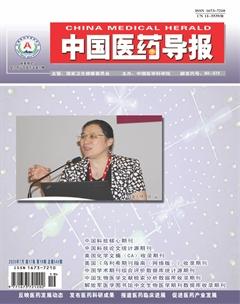臨床專科護士情緒智力、共情與支持性溝通的現狀與關系分析
郭洋村 周利華 王維利



[摘要] 目的 調查臨床專科護士情緒智力、共情與支持性溝通的現狀,并分析三者之間的關系。 方法 采用方便抽樣法,選取2018年7~9月安徽醫科大學第一附屬醫院及中國科學技術大學附屬第一醫院的臨床專科護士410名為研究對象,運用一般資料問卷、情緒智力量表、人際反應指針問卷與支持性溝通量表進行調查。 結果 最終回收382份,有效回收率為93.2%。臨床專科護士情緒智力、共情、支持性溝通總分分別為(82.63±11.76)、(46.00±9.13)、(70.64±5.64)分;觀點采擇、同情關心、自我情緒監測、情緒運用、情緒調節均與支持性溝通呈正相關(r = 0.331、0.139、0.337、0.344、0.256,P < 0.01);個人痛苦與支持性溝通呈負相關(r = -0.012,P < 0.01);共情在情緒智力與支持性溝通之間起部分中介作用。 結論 情緒智力與共情是臨床專科護士支持性溝通的重要影響因素,管理者及臨床專科護士應當注重提高護士的情緒智力與共情,使護士更加高效地為患者提供優質的護理。
[關鍵詞] 臨床專科護士;情緒智力;共情;支持性溝通
[中圖分類號] R47-4 ? ? ? ? ?[文獻標識碼] A ? ? ? ? ?[文章編號] 1673-7210(2020)07(a)-0186-04
[Abstract] Objective To investigate the current situation of emotional intelligence, empathy and supportive communication among clinical nurses and analyze the relationship among them. Methods Convenience sampling was sued, from July to September 2018, 410 nurses from the First Affiliated Hospital of Anhui Medical University and the First Affiliated Hospital of University of Science and Technology of China were selected as the study subjects, general information questionnaire, emotional intelligence scale, interpersonal response indicator questionnaire and supportive communication scale were used to investigate. Results Finally, 382 copies were recovered with an effective recovery rate of 93.2%. The total scores of emotional intelligence, empathy and supportive communication were (82.63±11.76), (46.00±9.13) points and (70.64±5.64) points, respectively. Opinion selection, sympathy and care, self-emotional monitoring, emotional application and emotional regulation were positively correlated with supportive communication (r = 0.331, 0.139, 0.337, 0.344, 0.256, P < 0.01). Personal distress was negatively correlated with supportive communication (r = -0.012, P < 0.01). Empathy was a mediator between emotional intelligence and supportive communication. Conclusion Emotional intelligence and empathy are important factors influencing the supportive communication of clinical nurses. Managers and clinical nurses should pay attention to improving the emotional intelligence and empathy of nurses, so that nurses can provide quality care to patients more efficiently.
[Key words] Clinical specialized nurses; Emotional intelligence; Empathy; Supportive communication
臨床專科護士是指在臨床護理領域中具有豐富的臨床經驗與知識,可直接提供高質量護理服務的護士[1-2]。臨床專科護士不僅需要豐富的理論知識、嫻熟的操作技能[3],也需要有較高水平的人際溝通能力[4]。支持性溝通有助于了解患者的身心狀況,促進護患之間的理解與支持[5]。情緒智力是指個體適應性的知覺、理解、調節自己與他人的情緒以及利用情緒解決問題的能力[6-8]。共情是一種感情的投射,共情能力高的護士能夠真誠地感知對方的情感和處境[9]。目前,關于臨床專科護士情緒智力、共情與支持性溝通的研究較少。本研究旨在調查臨床專科護士情緒智力、共情與支持性溝通的現狀,分析三者之間的關系,從而為提高臨床專科護士的支持性溝通能力提供相關參考。
1 對象與方法
1.1 研究對象
采取方便抽樣法,選取2018年7~9月安徽醫科大學第一附屬醫院及中國科學技術大學第一附屬醫院的臨床專科護士410名進行問卷調查。納入標準:①在職;②參加專科護士培訓并取得資格證書;③省級水平以上專科護士;④知情同意。排除標準:①實習、進修人員;②調查期間因休假等不在崗者。
1.2 研究方法
1.2.1 調查工具 ?①一般資料調查問卷:包括年齡、性別、專業技術職務、目前所在專科、從事目前所在專科的工齡等。②情緒智力量表(Wong&Law Emotional Intelligence Scale,WLEIS)[10]:該量表包括16個條目,采用Likert 7級計分法,從“完全不符合”到“完全符合”分別計1~7分。各維度得分總和為量表總分,總分16~102分,得分越高表示情緒智力水平越高。在本研究中的Cronbach′s α系數為0.895。③人際反應指針(IRI-C)問卷[11]:包括4個維度22個條目,采用自評方式,Likert 5級計分法,從“不恰當”到“非常恰當”,分別為0~4分。總分0~88分,得分越高表明個體共情水平越高。在本研究中的Cronbach′s α系數為0.724。④支持性溝通量表[12]:該量表包括3個維度20個條目,采用Likert 5級計分,完全不同意計1分,完全同意計5分,均為正向計分。總分20~100分,得分越高表明人際溝通能力越強。在本研究中的Cronbach′s α系數為0.665。
1.2.2 調查方法 ?研究者使用統一指導語,遵循知情同意原則。共發放問卷410份,回收394份,回收率為96.1%,其中有效問卷382份,有效回收率為93.2%。
1.3 統計學方法
采用SPSS 24.0軟件對數據進行統計學分析。運用AMOS 24.0進行模型擬合,中介效應檢驗采用逐步回歸和偏差校正的非參數百分位Bootstrap方法進行檢驗。計量資料以均數±標準差(x±s)表示,計數資料以例數表示。采用多元線性回歸進行多因素統計分析。以P < 0.05為差異有統計學意義。
2 結果
2.1 臨床專科護士情緒智力、共情與支持性溝通的現狀
臨床專科護士情緒智力總分為(82.63±11.76)分,共情總分為(46.00±9.13)分,支持性溝通總分為(70.64±5.64)分。
2.2 臨床專科護士情緒智力、共情與支持性溝通的關系分析
2.2.1 情緒智力、共情與支持性溝通的相關性分析 ?觀點采擇、同情關心、自我情緒監測、情緒運用、情緒調節均與支持性溝通呈正相關(r = 0.331、0.139、0.337、0.344、0.256,P < 0.01);個人痛苦與支持性溝通呈負相關(r = -0.012,P < 0.01)。見表1。
2.2.2 情緒智力、共情對支持性溝通的回歸分析 ?以支持性溝通為因變量,情緒智力與共情各維度作為自變量進行多元線性回歸分析。見表2。
2.2.3 共情在情緒智力與支持性溝通之間的中介效應分析 ?本研究根據溫忠麟等[13]提出的中介效應檢驗流程得出標準化回歸方程:Y=21.706+0.435X+0.493M(Y:因變量;X自變量;M:中介變量)。系數a、b顯著,進而檢驗系數c′,回歸分析結果顯示c′(0.435)達到顯著水平。提示共情在臨床專科護士情緒智力與支持性溝通中發揮部分中介效應作用。
2.2.4 中介效應的驗證 ?采用極大似然法進行中介效應檢驗,結果顯示:卡方自由度比值(λ2/df)=2.91,擬合優度指數(GFI)=0.875。見圖1。結果顯示,情緒智力到支持性溝通的間接效應成立(95%CI:0.05~0.24),且情緒智力到支持性溝通的直接效應成立(95%CI:0.03~0.25)。
3 討論
3.1 臨床專科護士情緒智力、共情與支持性溝通的現狀分析
臨床專科護士情緒智力總分為(82.63±11.76)分,提示臨床專科護士總體情緒智力在中上水平,可能與護理工作中存在大量與情緒有關的勞動,迫使臨床護士處理情緒問題的能力不斷提高有關[14]。臨床專科護士共情總分為(46.00±9.13)分,處于較低水平,在實際情境中,由于繁忙工作的限制[15],臨床專科護士沒有充分運用共情能力去識別和接納患者的情緒與情感。臨床專科護士支持性溝通總分為(70.64±5.64)分,處于中等水平,因此建議管理者對護理人員開展有針對性的培訓。
3.2 臨床專科護士情緒智力、共情和支持性溝通的關系分析
3.2.1 情緒智力、共情均與支持性溝通呈正相關 ?本研究結果顯示,情緒智力與共情呈正相關(P < 0.05),較高的情緒智力水平可以為患者營造一個良好的康復氛圍[16]。情緒智力與支持性溝通呈正相關(P < 0.05),護士具備良好情緒智力可以推動護患溝通的順利進行[17]。共情與支持性溝通呈正相關(P < 0.01),即護士共情能力越高,就越能夠了解支持性溝通的狀態及變化,能夠自然地站在患者的角度考慮問題。
3.2.2 共情在情緒智力與支持性溝通之間起部分中介作用 ?共情包括認知、情感及行為3個方面[18]。本研究顯示,共情在臨床專科護士情緒智力與支持性溝通之間起部分中介作用,可能是因為共情對支持性溝通有正向預測作用。護理人員通過具備共情的意識、表達共情、共情反饋等方式讓患者感受到自己被理解,被尊重,從而增強護患溝通的效果[19]。護士需經常安慰患者及家屬,幫助他們認識疾病,安撫其不良情緒,而這些工作需要發揮情緒智力作用[20]。因此,臨床專科護士應重視共情能力的培養,進而有效改善護患關系。
4 小結
本研究構建了情緒智力、共情與支持性溝通3個變量間的關系模型,證實了共情在二者間的中介作用,提示臨床專科護士可以采取換位思考,同情關心等措施提高自身的支持性溝通水平。
[參考文獻]
[1] ?Scott RA. A description of the roles,activities,and skills of clinical nurse specialists in the United States [J]. Clin Nurse Spec,1999,13(4):183-190.
[2] ?Mayo AM,Ray MM,Chamblee TB,et al. The Advanced Practice Clinical Nurse Specialist [J]. Nurs Adm Q,2017, 41(1):70-76.
[3] ?Buckley L,Robertson S,Wilson T,et al. The Role of the Specialist Nurse in Gynaecological Cancer [J]. Curr Oncol Rep,2018,20(10):1-6.
[4] ?Salander P,Isaksson J,Granstr?觟m B,et al. Motives that head and neck cancer patients have for contacting a specialist nurse - an empirical study [J]. J Clin Nurs,2016(21/22):3160-3166.
[5] ?Jones SM. The Impact of Mindfulness on Supportive Communication Skills:Three Exploratory Studies [J]. Mindfulness,2015,6(5):1115-1128.
[6] ?Henry D. Emotional Intelligence [J]. Am J Nurs,2017,117(10):13-19.
[7] ?Chao M,Shih CT,Hsu SF. Nurse occupational burnout and patient-rated quality of care:The boundary conditions of emotional intelligence and demographic profiles [J]. Jpn J Nurs Sci,2016,13(1):156-165.
[8] ?Davies S,Jenkins E,Mabbett G. Emotional intelligence:district nurses′ lived experiences [J]. Br J Community Nurs,2010,15(3):141-146.
[9] ?Vacho DD,Lynam DR,Johnson JA. The(non)relation between empathy and aggression:surprising results from a meta-analysis [J]. Psychol Bull,2014,140(3):751-773.
[10] ?Extremera Pacheco N,Rey L,Sánchez-?譧lvarez N. Validation of the Spanish version of the Wong Law Emotional Intelligence Scale (WLEIS-S) [J]. Psicothema,2019,31(1):94-100.
[11] ?安秀琴.杰弗遜共情量表(JSE-HP)在護士中的應用研究[D].太原:山西醫科大學,2008.
[12] ?袁秋環.護生評判性思維能力及其與人際溝通能力、自我效能感的相關性[D].青島:山東大學,2008.
[13] ?溫忠麟,葉寶娟.中介效應分析:方法和模型發展[J].心理科學進展,2014,22(5):731-745.
[14] ?Kaur D,Sambasivan M,Kumar N. Impact of emotional intelligence and spiritual intelligence onthe caring behavior of nurses:a dimensionlevel exploratory study among public hospitals in Malaysia [J]. Appl Nurs Res,2015,28(4):293-298.
[15] ?Allenbaugh J,Corbelli J,Rack L,et al. A Brief Communication Curriculum Improves Resident and Nurse Communication Skills and Patient Satisfaction [J]. J Gen Intern Med,2019,34(7):1-7.
[16] ?Bledow R,Schmitt A,Frese M,et al. The affective shift model of work engagement [J]. J Appl Psychol,2011,96(6):1246-1257.
[17] ?Cunico L,Sartori R,Marognolli O,et al. Developing empathy in nursing students:a cohort longitudinal study [J]. J Clin Nurs,2012,21(13/14):2016-2025.
[18] ?Burridge LH,Winch S,Kay M,et al. Building compassion literacy:Enabling care in primary health care nursing [J]. Collegian,2017,24(1):85-91.
[19] ?Taleghani F,Ashouri E,Saburi M. Empathy,Burnout,Demographic Variables and their Relationships in Oncology Nurses [J]. Iran J Nurs Midwifery Res,2017,22(1):41-45.
[20] ?Haramati A,Cotton S,Padmore JS,et al. Strategies to promote resilience,empathy and well-being in the health professions:Insights from the 2015 CENTILE Conference [J]. Med Teach,2017,39(2):118-119.
(收稿日期:2019-11-19)

